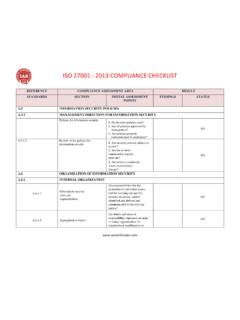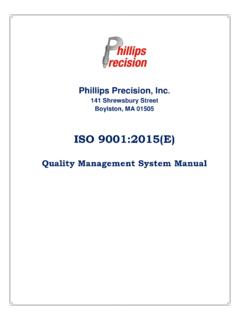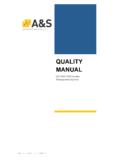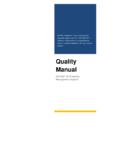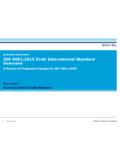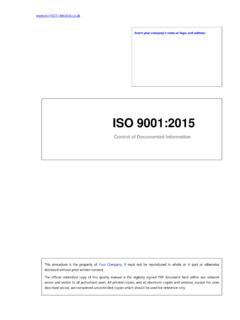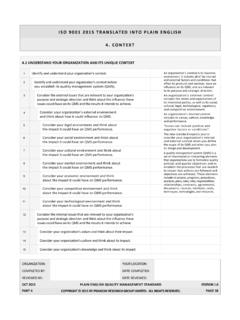Transcription of INTERNAL QUALITY MANAGEMENT SYSTEM ... - …
1 INTERNAL QUALITY MANAGEMENT SYSTEM AUDIT CHECKLIST (ISO9001: 2015 ) Page 1 Q# iso 9001 : 2015 Clause Audit Question Audit Evidence 4 Context of the Organization Understanding the organization and its context The organization shall determine external and INTERNAL issues that are relevant to its purpose and its strategic direction and that affect its ability to achieve the intended result(s) of its QUALITY MANAGEMENT SYSTEM . How has the organization determined external and INTERNAL issues relevant to its purpose and strategic direction? How do these affect the ability to achieve the intended result of the QMS? The organization shall monitor and review the information about these external and INTERNAL issues. How do you monitor and review information about these INTERNAL and external issues? NOTE 1 Understanding the external context can be facilitated by considering issues arising from legal, technological, competitive, market, cultural, social, and economic environments, whether international, national, regional or local.
2 NOTE 2 Understanding the INTERNAL context can be facilitated by considering issues related to values, culture knowledge and performance of the organization. Understanding the needs and expectations of interested parties Due to their impact or potential impact on the organization s ability to consistently provide products and services that meet customer and applicable statutory and regulatory requirements, the organization shall determine: a) the interested parties that are relevant to the QUALITY MANAGEMENT SYSTEM ; b) the requirements of these interested parties that are relevant to the QUALITY MANAGEMENT SYSTEM . How have you determined what interested parties are relevant to the QMS? How have you determined what requirements those parties have that are relevant to the QMS? How has impact or potential impact been determined? The organization shall monitor and review the information about these interested parties and their relevant requirements. How do you monitor and review the information about interested parties and their relevant requirements?
3 Determining the scope of the QUALITY MANAGEMENT SYSTEM The organization shall determine the boundaries and applicability of the QUALITY MANAGEMENT SYSTEM to establish its scope. How have the boundaries and applicability of the QMS been used to establish the scope of the organization? When determining this scope, the organization shall consider: a) the external and INTERNAL issues referred to in ; b) the requirements of relevant interested parties referred to in ; c) the products and services of the organization. How have: The external and INTERNAL issues; The requirements of relevant interested parties and; The products and services of the organization been considered when determining the scope of the organization? Where a requirement of this International Standard within the determined scope can be applied, then it shall be applied by the organization. How has the application of the International Standard within the scope been determined, and how has it been applied by the organization?
4 Page 2 Q# iso 9001 : 2015 Clause Audit Question Audit Evidence If any requirement(s) of this International Standard cannot be applied, this shall not affect the organization s ability or responsibility to ensure conformity of products and services. How have any requirements of the International Standard been determined as not applicable? Show me how conformity of products and services are not affected by this. The scope shall be available and be maintained as documented information stating the: - products and services covered by the QUALITY MANAGEMENT SYSTEM ; - justification for any instance where a requirement of this International Standard cannot be applied. Where is the scope available? Where is it maintained as documented information? Does it state what products and services are covered by the QMS? Does it justify how instances of requirements of the QMS cannot be applied? Scope required as documented information. QUALITY MANAGEMENT SYSTEM and its processes The organization shall establish, implement, maintain and continually improve a QUALITY MANAGEMENT SYSTEM , including the processes needed and their interactions, in accordance with the requirements of this International Standard.
5 How has the QMS been established? Show me how this is implemented. How is it maintained and continually improved? How have the processes been determined and how do they interact? The organization shall determine the processes needed for the QUALITY MANAGEMENT SYSTEM and their application throughout the organization and shall determine: a) the inputs required and the outputs expected from these processes; b) the sequence and interaction of these processes; c) the criteria, methods, including measurements and related performance indicators needed to ensure the effective operation, and control of these processes; d) the resources needed and ensure their availability; e) the assignment of the responsibilities and authorities for these processes; f) the risks and opportunities in accordance with the requirements of , and plan and implement the appropriate actions to address them; g) the methods for monitoring, measuring, as appropriate, and evaluation of processes and, if needed, the changes to processes to ensure that they achieve intended results; h) opportunities for improvement of the processes and the QUALITY MANAGEMENT SYSTEM .
6 How have the processes been determined for the QMS? What are the inputs and outputs for those processes? What is the sequence and interaction of the processes? What are the criteria, methods, measurement and related performance indicators needed to operate and control those processes? What resources are needed and how are these made available? How are responsibilities and authorities assigned for those processes? How are risks and opportunities considered and what plans are made to implement actions to address them? What methods are used to monitor, measure and evaluate processes and, if needed, what changes are made to achieve intended results? How are opportunities to improve the processes and the QMS determined? The organization shall maintain documented information to the extent necessary to support the operation of processes and retain documented information to the extent necessary to have confidence that the processes are being carried out as planned.
7 What documented information exists to support the operation of processes? How is this documented information retained? How is confidence that the processes are being carried out as planned determined? Documented information to support the operation of processes. Page 3 Q# iso 9001 : 2015 Clause Audit Question Audit Evidence 5 Leadership Leadership and commitment Leadership and commitment for the QUALITY MANAGEMENT SYSTEM Top MANAGEMENT shall demonstrate leadership and commitment with respect to the QUALITY MANAGEMENT SYSTEM by: a) taking accountability of the effectiveness of the QUALITY MANAGEMENT SYSTEM ; b) ensuring that the QUALITY policy and QUALITY objectives are established for the QUALITY MANAGEMENT SYSTEM and are compatible with the strategic direction and the context of the organization; c) ensuring that the QUALITY policy is communicated, understood and applied within the organization; d) ensuring the integration of the QUALITY MANAGEMENT SYSTEM requirements into the organization s business processes; e) promoting awareness of the process approach; f) ensuring that the resources needed for the QUALITY MANAGEMENT SYSTEM are available.
8 G) communicating the importance of effective QUALITY MANAGEMENT and of conforming to the QUALITY MANAGEMENT SYSTEM requirements; h) ensuring that the QUALITY MANAGEMENT SYSTEM achieves its intended results; i) engaging, directing and supporting persons to contribute to the effectiveness of the QUALITY MANAGEMENT SYSTEM ; j) promoting continual improvement; k) supporting other relevant MANAGEMENT roles to demonstrate their leadership as it applies to their areas of responsibility. Show me how top MANAGEMENT demonstrates leadership and commitment the QMS by taking accountability of the effectiveness of the QMS. How is the QUALITY policy and objectives established for the QMS and how are they compatible with the strategic direction and the organizational context? How is the QUALITY policy communicated within the organization? Show me how this is understood and applied. How are the requirements of the QMS integrated into the business processes? How do you promote awareness of the process approach?
9 How do you ensure that resources needed for the QMS area available? How do you communicate the importance of effective QUALITY MANAGEMENT ? How do you communicate the importance of conforming to the QMS requirements? How do you ensure that the QMS achieves its intended results? How do you engage, direct and support people to contribute to the effectiveness of the QMS? How do you promote continual improvement? How do you support other relevant MANAGEMENT roles to demonstrate leadership in their areas of responsibility? NOTE Reference to business in this International Standard can be interpreted broadly to mean those activities that are core to the purposes of the organization s existence; whether the organization is public, private, for profit or not for profit. Page 4 Q# iso 9001 : 2015 Clause Audit Question Audit Evidence Customer focus Top MANAGEMENT shall demonstrate leadership and commitment with respect to customer focus by ensuring that: a) customer requirements and applicable statutory and regulatory requirements are determined and met; b) the risks and opportunities that can affect conformity of products and services and the ability to enhance customer satisfaction are determined and addressed; c) the focus on consistently providing products and services that meet customer and applicable statutory and regulatory requirements is maintained; d) the focus on enhancing customer satisfaction is maintained.
10 Show me how top MANAGEMENT demonstrates leadership and commitment customer focus ensuring requirements and applicable statutory and regulatory requirements are determined and met. How are risks and opportunities that can affect conformity of products and services determined? How is the ability to enhance customer satisfaction determined and addressed? How is the focus on consistently providing products and services that meet customer and applicable statutory and regulatory requirements maintained? How is customer satisfaction maintained? QUALITY policy Top MANAGEMENT shall establish, review and maintain a QUALITY policy that: a) is appropriate to the purpose and context of the organization; b) provides a framework for setting and reviewing QUALITY objectives; c) includes a commitment to satisfy applicable requirements; d) includes a commitment to continual improvement of the QUALITY MANAGEMENT SYSTEM . How does top MANAGEMENT establish, review and maintain a QUALITY policy?
